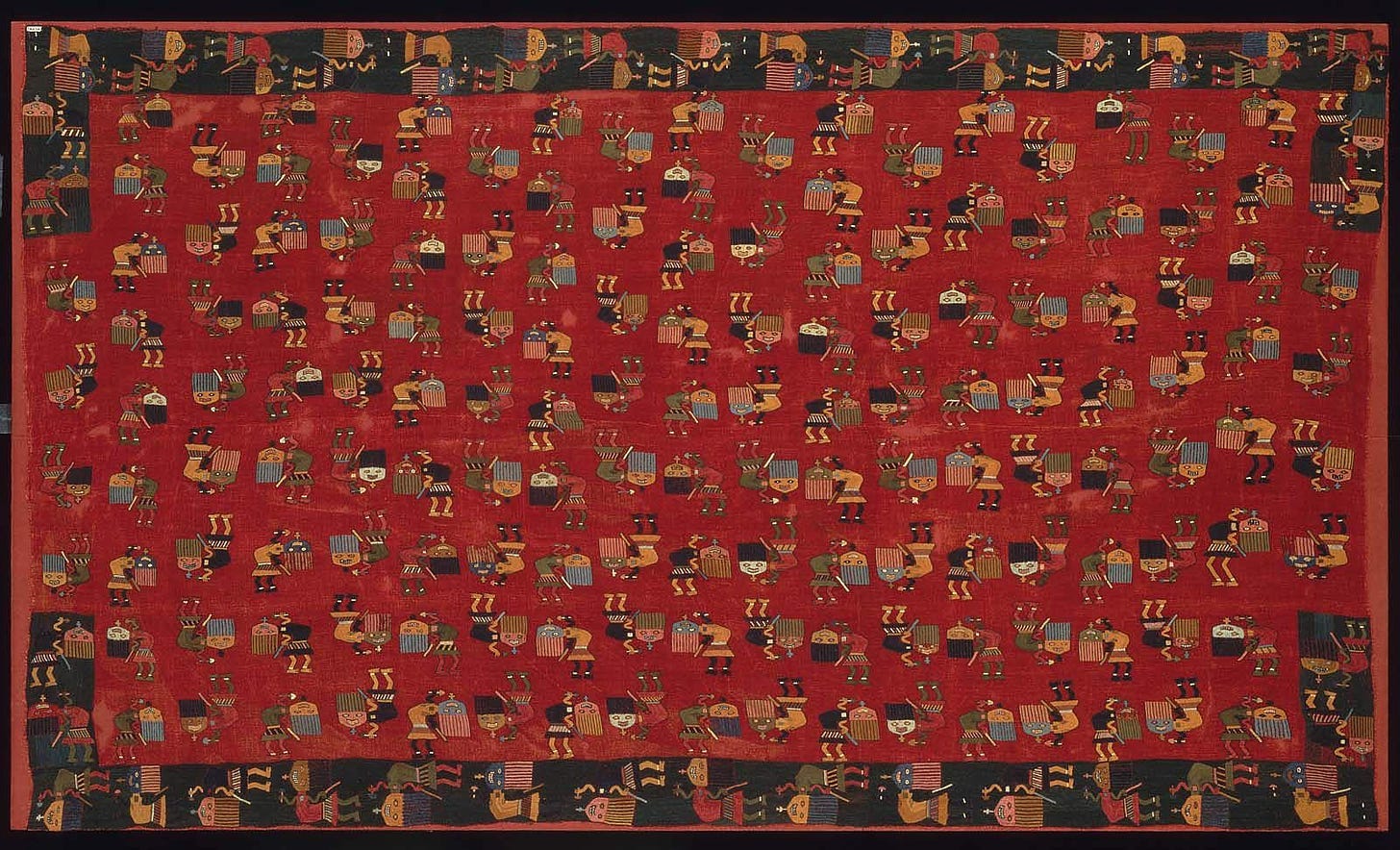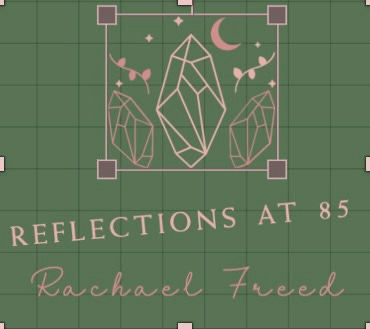
Although Lisa Renee is still in her middle years (her SubStack column is titled “The Long Middle”) when I read her post, “The Lost Thread” I was entranced. I’m not sure why. Perhaps it has to do with my belief that when we reflect on our lives over time, it seems that each life is a single thread - of meaning and purpose, of length of life, a unique path that we follow without conscious awareness. Maybe it evoked sadness for myself and others when we lose “our” thread, meander aimlessly for a period in our lives. Maybe I was unexpectedly relieved when she shared her secret and received a new thread.
I contacted Lisa to ask her if I could share her post with my readers and she said she’d be honored. I especially appreciated Dorianne Laux’ poem that is at the end of the post, and feels older than middle age, like I feel at 85. So here it is; I hope you are touched by her story and its relationship to you.:
Color Block Mantle, Peruvian (Paracas), first century C.E., wool, plain weave, embroidered with wool
Decades ago, when I was a twenty-something work-in-progress, I pinched a tiny, loose red thread from an ancient textile in a museum basement. Now, as a nearly sixty work-in-progress, I can’t find it.
I’ve lost the thread.
It was a delicate whisper and sat on the tip of my finger like a slip of blood. After bringing it home, it lived with shattered windshield glass in a tiny metal box that my first husband took from a dying man’s house. Then, it lived in a tiny stained-glass box, along with the smallest seashells on earth. The boxes, and the thread, have moved with me many times, in trucks and cars, across state lines. Through marriage, divorce, and more marriage; through kids and chaos. That little ancient stolen thread — nested in tiny boxes, squirreled away in bigger boxes and bags, drawers and closets — stayed with me. It made me wonder about the hands (women’s hands, I’m sure) that wove it, dyed it, used it. Pre-Columbian, the museum tag said, but all that means is before Columbus the colonizer. Hundreds of years ago? Thousands? Central America? South America? Somewhere in an unfathomably vast land. Eons of time defined by a plundering man’s name.
Who touched the red thread?
I did. I held it tenderly, awestruck and reverent. It went first into my pocket and then into supposedly precious boxes only to turn up missing here in this house where it slept, unappreciated, for many years. It used to burn a little hole in my consciousness, a pinprick of light, and I would check on it, remember the scene of its taking, wonder at its provenance and my brief criminal career. But then life took over and got busy, too much to do, too many things. I forgot about the red thread and now it’s gone.
A practical explanation is that it — tiny wisp of a thing — fell unseen from its box in a move. From this box to that, from this drawer to that. Or perhaps I was visiting it and got distracted — old forgotten thing — and neglected to secure it, to properly protect it.
A possibly less practical explanation is that it simply disintegrated. Disappeared, the way we all will given time and conditions. I would expect to see dust in its hiding place, dust of a particular bloody hue, but it’s not there. There’s dust everywhere in this old house, but no special, ancient, pre-Columbian dust that I can find.
The least practical (and my favorite) explanation is magic. The thread was magicked away from me, by a spirit, a ghost, an unknown force that recognized a thing out of place. I have no right, really, to keep this bit of history imprisoned in a box in my house. I had no right to take it (though my tiny boxes seem no worse than the dark drawers of that basement museum department). I had no reason, just a Golem-ish fascination with a pretty thing in a weak moment. Perhaps I have offended the gods and goddesses, and it has been set right.
I’ve lost the thread but maybe the thread was found. I suppose it is still with me, in a way — I’m going on about it here.
I wrote a draft of this in a writing class and read it aloud in a timid and trembling way. (I infuriate myself.) At the end of class, the teacher stood up and, wide-eyed, plucked a red thread from her chair. (Clearly from her red sweater, but still — eyes were wide.) She gave it to me and it sits here on my desk. Where will it be when I’m an old woman? When will I be an old woman?
What of the women who wove the lost thread, worked it into a textile? The women who stitched the world that now sits silent in museum basements, in drawers or under glass — what of them? They, too, are lost like the thread, their handwork cast to the four winds. And so it goes.
🧶 Lisa
A song and a poem:
Tom Waits’ “November”
“November has tied me
To an old dead tree
Get word to April
To rescue me”
“I Dare You” by Dorianne Laux
It’s autumn, and we’re getting rid of books, getting ready to retire, to move some place smaller, more manageable. We’re living in reverse, age-proofing the new house, nothing on the floors to trip over, no hindrances to the slowed mechanisms of our bodies, a small table for two. Our world is shrinking, our closets mostly empty, gone the tight skirts and dancing shoes, the bells and whistles. Now, when someone comes to visit and admires our complete works of Shakespeare, the hawk feather in the open dictionary, the iron angel on a shelf, we say take them. This is the most important time of all, the age of divestment, knowing what we leave behind is like the fragrance of blossoming trees that grows stronger after you’ve passed them, breathing them in for a moment before breathing them out. An ordinary Tuesday when one of you says I dare you, and the other one just laughs.
—Dorianne Laux, "I Dare You"
_______________________________________
A special action section for Legacy Tips&Tools subscribers:
1. Reflection: if you’ve ever felt that you lost your thread, how did you retrieve it, or didn’t you.
2. Reflection: What feelings and thoughts do you have about considering your life a unique thread?
3. Write a letter sharing what you know about your life thread (especially if you’ve kept it a secret, and share it with someone who will understand.
4. Write your response to the closing poem, “I Dare You,” and share it and the poem with an aging friend.
_______________________________________
*********************************************************************
I’m facilitating a 3 session legacy workshop for AARP in March, 2024. It’s free. More details to come - - -
*********************************************************************
My books about legacy writing are available at Amazon or can be ordered from your local independent bookseller. Women’s Lives, Women’s Legacies, The Legacy Workbook for the Busy Woman and for all genders, Your Legacy Matters.
**********************************************************************





I didn't lose my thread, it changed colors as I have changed over the years. Pam
Both the story of the red thread and the poem at the end of the piece are exquisite and evocative. I always remember a line from a French movie...."you can only take with you what you've already given away." Just now, I'm wondering what I did with an audio tape that has a few words of my father's speech on it, the only remnant of the sound of his voice.